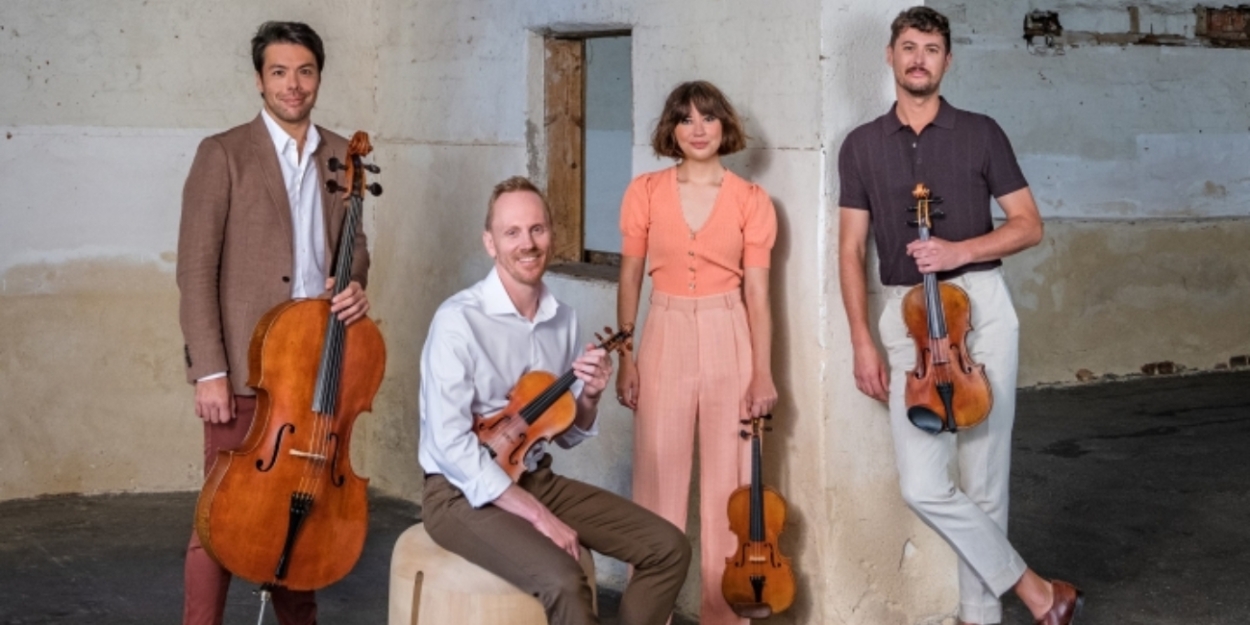Review: VANGUARD at Elder Hall, University Of Adelaide
A rewarding concert performance.

Reviewed by Ewart Shaw Friday 5th July 2024.
It’s a question of definition. There is The string quartet and there is A string quartet, the work, and the workers. Vanguard is the concert tour that brought the Australian String Quartet home to Elder Hall with music-making of the highest order. Led by first violin, Dale Barltrop, with second violin, Francesca Hiew, violist, Chris Cartlidge, and ‘cellist, Michael Dahlenburg, the quartet has given seven performances of this program across Australia.
To borrow an expression from another field of entertainment, it was very much a game of two halves. The second half featured a major and little-known work from the 1930s, and a premiere of a piece only a few years old. The concert began, though, with one of the great late Beethoven quartets, the Op. 127 in E-flat major. Beethoven wrote the notes and the ASQ played with the intelligence and insight that is their hallmark.
It was after the interval that Francesca Hiew, second violin, put the work into some context. It’s the first of the last string quartets, following major masterworks like the Ninth Symphony and the Missa Solemnis. Totally deaf and in failing health, Beethoven returned to a form he understood and loved. A familiar statement takes a new and surprising turn, as if he’s noticed something in another part of his musical landscape and wants to take a closer look. The meditative second movement bursts for a while to a luminous and uplifting melody before falling back into a meditative resolution. Then the next two movements, the scherzo and finale, hum and buzz with joyous energy. Whatever else is happening to the composer he has found joy in a familiar place.
The second half led off with the brief, one-movement String Quartet No. 2 of contemporary Australian composer, Harry Straulig. It’s a delicious piece condensing so many aspects of the string quartet’s potential for expression. There are strong romantic chord passages and a moment of fascinating textural expression as the first violin trills almost imperceptibly at the top of its range as the ‘cello pours out a sturdy melodic passage. It’s a brief and illuminating moment. I so want to hear it again. It is, by the by, a work commissioned by John Griffiths for his wife Beth. Thank you for sharing. The composer attended most performances of the work during the Vanguard tour. I’d like to think that it will attract the interest of other ensembles and managements, otherwise, these could be the last performances.
I don’t share violist Chris Cartlidge’s glowing description of Erich Wolfgang Korngold’s level of genius as being like Mozart’s. He is, however, the man whose arrival in America in the early nineteen thirties brought the musical potential of the late romantic orchestra to the big screen. His second string quartet, the Opus 26 in E flat major is a finely crafted work drawing on the grand tradition. There is a darkness in the third movement, marked Larghetto, which slowly resolves into a long and wistful continuation. The last movement is a waltz, after all, he’s Viennese, but this is a little unsteady on its feet. The dancers swoop and sway, and, let me say, there’s not a recording of this work that captures the same sensuality of the live performance. Four hearts beating as one in three-quarter time. Ah, had he stayed in Europe and not been seduced by the siren call of a Mahler-sized Hollywood orchestra, what might he have achieved?
The audience headed out into the cold of an Adelaide winter’s night, but their departure was delayed by a venue on the lawn, as far from the draughty marquees of yesteryear as it would be possible to go. Comfortable chairs, elegant lighting, a bar with reasonable prices and attentive service, and a crowd of music lovers finishing their evening’s entertainment with delight. The one drawback to this tented paradise was that it completely hid the Elder Hall from view, and I heard several patrons saying that they had to consult their phone maps in order to find the destination. A temporary oasis, but so welcome, allowing an enthralled audience to slow their return to the real world.
Reader Reviews

Videos


